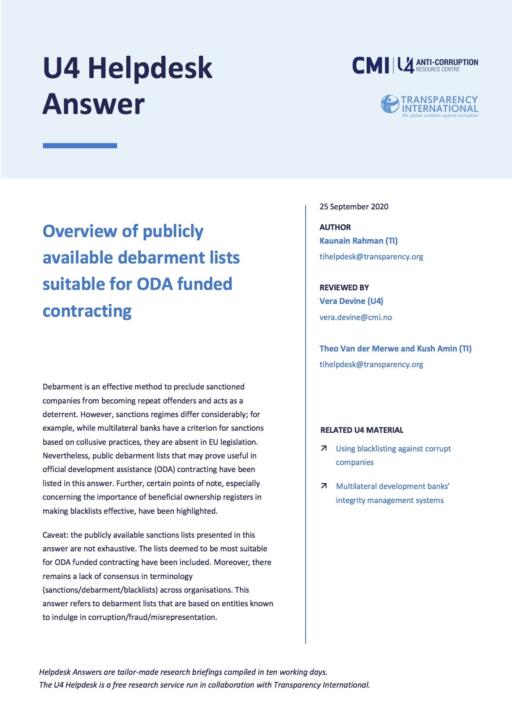- Home
- Anti-Corruption Helpdesk
- Overview of publicly available debarment lists suitable for ODA funded contracting
Overview of publicly available debarment lists suitable for ODA funded contracting

This Anti-Corruption Helpdesk brief was produced in response to a query from a U4 Partner Agency. The U4 Helpdesk is operated by Transparency International in collaboration with the U4 Anti-Corruption Resource Centre based at the Chr. Michelsen Institute.
Query
In light of the OECD recommendation 6.iv of the Council for Development Co-operation Actors on Managing Risks of Corruption, published in December 2016, to "Verify publicly available debarment lists of national and multilateral financial institutions during the applicant’s selection process; include such lists as a possible basis of exclusion from applying for official development assistance (ODA) funded contracts", please provide:
i) an inventory of publicly available debarment/sanction lists, and a short description of background, purpose, etc., and why they are/not suitable to consult in ODA funded contract application processes
ii) any information on lists other donors consult in their due diligence/application process for ODA funded contracts
iii) any other useful information to investigate what lists and why they should/not be consulted in the application process of ODA funded contracts to address risks of corruption and other irregularities, financing of terrorism, money laundering, etc.
Summary
Debarment is an effective method to preclude sanctioned companies from becoming repeat offenders and acts as a deterrent. However, sanctions regimes differ considerably; for example, while multilateral banks have a criterion for sanctions based on collusive practices, they are absent in EU legislation. Nevertheless, public debarment lists that may prove useful in official development assistance (ODA) contracting have been listed in this answer. Further, certain points of note, especially concerning the importance of beneficial ownership registers in making blacklists effective, have been highlighted.
Contents
- Background
- Publicly available sanctions lists
- Challenges in due diligence
- References
Main points
- Debarment regimes send a signal that access to public procurement markets requires compliance with laws and regulations.
- There are several publicly available sanctions lists from sources such, as multilateral financial institutions (MDBs, such as World Bank), cross-debarment lists, United Nations, European Union, and national financial institutions in countries such as the United States and Japan.
- Beneficial ownership registers may prove of value in using blacklists effectively by sifting out the actual beneficial owner of a sanctioned company.
- Greater bilateral disclosure of information between development practitioners is required.
Caveat
The publicly available sanctions lists presented in this answer are not exhaustive. The lists deemed to be most suitable for ODA funded contracting have been included. Moreover, there remains a lack of consensus in terminology (sanctions/debarment/blacklists) across organisations. This answer refers to debarment lists that are based on entities known to indulge in corruption/fraud/misrepresentation.
Authors
Kaunain Rahman (TI), [email protected]
Reviewers
Vera Devine (U4), [email protected]
Theo Van der Merwe and Kush Amin (TI), [email protected]
Date
29/10/2020

